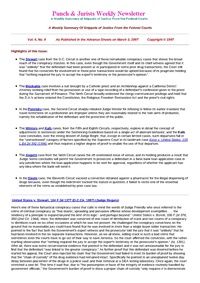This is a rare case that shows how persistence sometimes pays off. Here, a drug conviction was vacated because the First Circuit felt that the trial judge had not properly explained the meaning of improper inducement for purposes of the defendant's entrapment defense. The defendant claimed that he was …
For nearly a decade Leonard Pelullo has fought a lonely battle trying to disprove the constantly refiled charges that he engaged in a series of illegal schemes with the dreaded Mafia in 1986 to defraud a public company. Already this besieged defendant has gone through four earlier trials. Three …
Conviction reversed because jury instructions did not adequately explain meaning of improper inducement for purposes of entrapment defense.
This is a case that reeks with intrigue and an elaborately staged (albeit somewhat preposterous) sting operation that involved Government agents posing as hit men and the participation of Federal agents in a
controlled breakout from Rikers Island.
Even though the Court found that the Government's participation in the …
United States v. Winters, 105 F.3d 200 (5th Cir. 1997) (Judge Furgeson)
United States v. Kalb, 105 F.3d 426 (8th Cir. 1997) (Judge Loken)
When, if ever, is a sentence reduction warranted because the defendant committed "a single act of aberrant behavior"? Both of these cases delve into that …
Court rejected Government claim that, because Presentence Report contained a full recitation of defendant's criminal conduct, this put the defendant on notice of the factors supporting an upward departure.
After the defendant in this case was convicted of the usual diet of bank fraud, conspiracy and money laundering …
Case is noted for Judge Becker's strong dissent in which he argues that the defendant did not have constructive possession over the drugs charged since she had no dominion or control over the drugs.
This is a case that should scare a lot of people who have always …
This case adds a new twist to the fine art of parsing the commonly-applied rule that a co-conspirator is responsible for the acts of another member of the conspiracy. Here the defendant pleaded guilty to conspiracy to possess drugs with intent to distribute and to using and carrying a …
Here the court affirmed a drug conviction even though the Government and its chief witness agreed it was unlikely that the defendant participated in some prior drug transactions, because "nothing required the jury to accept" that testimony.
Here's one of those fantastical conspiracy cases that calls to mind …
Court affirmed dismissal of indictment on grounds that communications via e-mail expressing sexual interest in violence against women did not constitute "communications containing a threat.".
Over the strong dissent of Judge Krupansky, the Sixth Circuit affirmed a lower court's decision to dismiss an indictment that charged the defendants …
Here the Court vacated a sentence because travel restrictions imposed were not reasonably related to the defendant's rehabilitation or the public interest - the twin goals of probation.
In a tersely worded decision, the Second Circuit took Judge Wexler to task for refusing to adhere to its earlier …
This is an interesting case that involves an action brought by a Catholic priest and an Archbishop against various defendants challenging a district attorney's decision to tape a suspect's confession while the priest was administering the Sacrament of Penance in jail. The plaintiffs sought destruction of the tape and …
This is an interesting case that involves an action brought by a Catholic priest and an Archbishop against various defendants challenging a district attorney's decision to tape a suspect's confession while the priest was administering the Sacrament of Penance in jail. The plaintiffs sought destruction of the tape and …
QUOTE OF THE WEEK - One of those hypothetical questions that will never be answered!
"Do draconian sentences for first time offenders demanded by the [law] make any sense in the face of evidence that a prisoner could be rehabilitated rather than virtually destroyed by lengthy incarceration?" United States …
Case denied request for new trial based on alleged juror misconduct in failing to answer truthfully during voir dire.
This is an interesting case that involves an action brought by a Catholic priest and an Archbishop against various defendants challenging a district attorney's decision to tape a suspect's confession while the priest was administering the Sacrament of Penance in jail. The plaintiffs sought destruction of the tape and …
Although the concept of "venue" is deeply enshrined in Article III, § 2 of the Constitution, as well as in 18 U.S.C. § 3232 and Rule 18 of the Fed.R.Crim.P., it is not a topic that is litigated much these days. Yet it was in this case, and the …
Here the Court held that an unexplained 12-day delay in placing drugs under seal was harmless error.
In this case the majority held that "aberrant conduct" is an "unmentioned" factor within the framework outlined by Koon v. U.S., and, as such, it requires a greater degree of proof to take a case out of the Guidelines heartland.
United States v. Winters, 105 F.3d 200 (5th …
In this case a registered pharmacist was charged with dispensing controlled substances in violation of 21 U.S.C. § 841(a)(1). It was alleged that he filled numerous prescriptions for various controlled substances with full knowledge that the prescriptions were forged. After his conviction he appealed, arguing that the indictment was …
This case is noted for Judge Norris' dissent in which he argued that conviction based on where a bank happens to process a loan, regardless of whether the applicant has any idea where it will be sent, makes no sense in law or in logic.
Although the concept …
Once again the D.C. Circuit affirmed its hard-and-fast rule that a claim of entrapment defeats any chance of a sentence reduction for acceptance of responsibility under U.S.S.G. § 3E1.1. It also strongly criticized decisions from the Third, Sixth and Ninth Circuits which have suggested that raising an entrapment defense …
